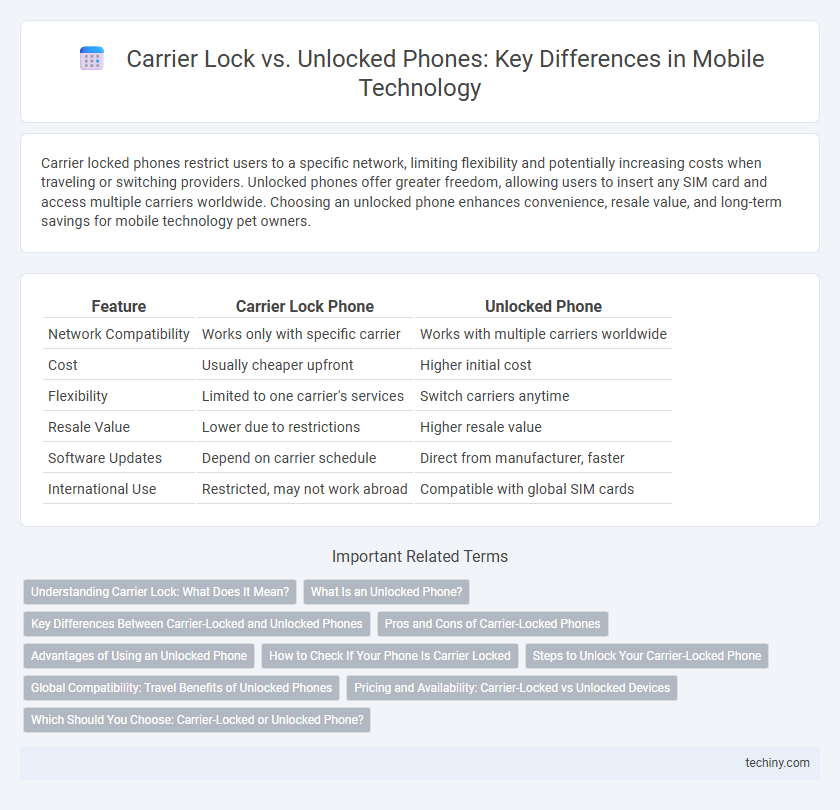Carrier locked phones restrict users to a specific network, limiting flexibility and potentially increasing costs when traveling or switching providers. Unlocked phones offer greater freedom, allowing users to insert any SIM card and access multiple carriers worldwide. Choosing an unlocked phone enhances convenience, resale value, and long-term savings for mobile technology pet owners.
Table of Comparison
| Feature | Carrier Lock Phone | Unlocked Phone |
|---|---|---|
| Network Compatibility | Works only with specific carrier | Works with multiple carriers worldwide |
| Cost | Usually cheaper upfront | Higher initial cost |
| Flexibility | Limited to one carrier's services | Switch carriers anytime |
| Resale Value | Lower due to restrictions | Higher resale value |
| Software Updates | Depend on carrier schedule | Direct from manufacturer, faster |
| International Use | Restricted, may not work abroad | Compatible with global SIM cards |
Understanding Carrier Lock: What Does It Mean?
A carrier lock restricts a mobile phone to operate only with a specific network provider, limiting its use with other carriers' SIM cards. This lock is typically imposed by carriers to ensure customers fulfill contract terms or installment payments. Understanding this restriction helps consumers make informed decisions when purchasing phones, especially if planning to switch networks or travel internationally.
What Is an Unlocked Phone?
An unlocked phone is a mobile device that is not restricted to a specific carrier, allowing users to insert SIM cards from any compatible network worldwide. This freedom enables greater flexibility for international travel and switching carriers without the need for device replacement. Unlocked phones often support multiple network bands and technologies, enhancing connectivity options and resale value.
Key Differences Between Carrier-Locked and Unlocked Phones
Carrier-locked phones are restricted to a specific mobile network provider, often limiting users to that carrier's services and hindering the ability to switch networks without approval or unlocking procedures. Unlocked phones offer the flexibility to use SIM cards from any carrier globally, enhancing compatibility with multiple networks and allowing easier international travel. Key differences include network restrictions, resale value, and the degree of user control over device customization and carrier plans.
Pros and Cons of Carrier-Locked Phones
Carrier-locked phones often offer lower upfront costs and exclusive carrier promotions, making them budget-friendly for many users. However, these devices restrict usage to a single network, limiting flexibility in switching carriers or using local SIM cards during travel. The limitation can result in higher long-term costs and reduced resale value compared to unlocked phones.
Advantages of Using an Unlocked Phone
Unlocked phones offer greater flexibility by allowing users to switch carriers without restrictions, enabling access to better deals and coverage worldwide. They provide enhanced resale value and eliminate the need for carrier-specific software, resulting in faster updates and fewer bloatware applications. Users benefit from increased compatibility with international SIM cards, making unlocked phones ideal for frequent travelers.
How to Check If Your Phone Is Carrier Locked
To check if your phone is carrier locked, navigate to the settings menu and look for network or SIM card options that restrict the device to a specific carrier. Another method involves inserting a SIM card from a different carrier and confirming whether the phone registers the new network or displays an error message. Online tools and carrier customer support can also verify the lock status using the device's IMEI number.
Steps to Unlock Your Carrier-Locked Phone
To unlock your carrier-locked phone, first contact your mobile carrier to check eligibility and request an unlock code or procedure, which often requires your account to be in good standing. Next, enter the provided unlock code on your device or follow carrier-specific instructions, such as connecting to Wi-Fi or performing a factory reset. Finally, confirm the unlock by inserting a SIM card from a different carrier and verifying network connectivity, ensuring your phone is fully unlocked for use with other providers.
Global Compatibility: Travel Benefits of Unlocked Phones
Unlocked phones provide superior global compatibility by allowing users to switch SIM cards from different carriers worldwide, enhancing connectivity during international travel. Carrier locks restrict the phone to a single network, limiting access to local SIM cards and potentially incurring high roaming charges. Choosing an unlocked mobile device offers flexibility, cost savings, and seamless communication across multiple countries.
Pricing and Availability: Carrier-Locked vs Unlocked Devices
Carrier-locked phones typically come at a lower upfront cost due to subsidies or installment plans offered by network providers, but they restrict device use to a single carrier. Unlocked phones, while often more expensive initially, provide broader availability through multiple retailers and the flexibility to switch carriers without additional fees. Pricing strategies vary significantly with carrier-locked devices tied to contract terms, whereas unlocked phones reflect full market value and enhance long-term cost-effectiveness for consumers seeking versatility.
Which Should You Choose: Carrier-Locked or Unlocked Phone?
Choosing between a carrier-locked and an unlocked phone depends on your priorities for flexibility and cost. Carrier-locked phones often come with lower upfront prices and exclusive carrier deals, but they limit your ability to switch networks freely. Unlocked phones offer the advantage of using any compatible SIM card worldwide, providing maximum freedom for travel and carrier selection without restrictions.
Carrier Lock vs Unlocked Phone Infographic

 techiny.com
techiny.com